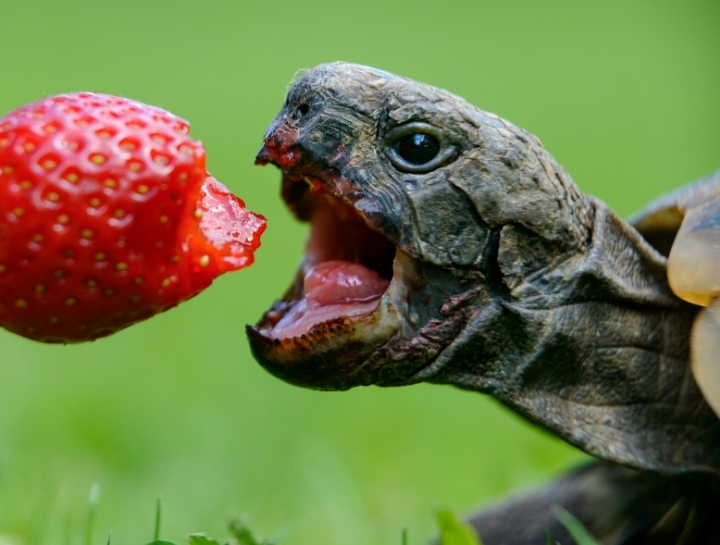Proper Nutrition for Herbivorous Reptiles & Amphibians

The correct balance of protein, carbohydrates, fats, fiber, vitamins and minerals is essential for the proper nutrition to be provided to reptiles and amphibians. A diet consisting of primarily one ingredient is never sufficient.
Lettuce, celery, and carrots are human "diet" food and are low in calories — never feed your pet reptile or amphibian large quantities of these foods. Meat and meat by-products are grossly unbalanced and also not appropriate for herbivorous species. Never feed them meats.
A properly balanced diet for pet reptiles and amphibians can be formulated using the following:
Plant Materials
- Uncooked frozen mixed vegetables (be sure to thaw/warm them before serving)
- Collard, mustard, beets, turnip greens and carrot tops
- Swiss chard, romaine/green/red leaf lettuce, escarole
- Cabbage, broccoli, kale, cauliflower, brussel sprouts (these should not be fed in high volumes, as too much may lead to thyroid issues)
- Green peas (including pods), fresh corn, cucumbers, string beans
- Dandelions (both greens and flowers), clover (red and white)
- Various squashes, pumpkins, sweet potatoes, and other tubors
- Fruit like berries, melons, apples, pears, bananas, peaches, and plums
- Breads and dry cereals
Protein
- Species-specific pelleted rations provide a complete and balanced nutrition for plant-eating species. They are typically made for specific groups of herbivorous animals like tortoises and iguanas. Be sure to soak these in water until soft or mix with other foods like in salad.
- High quality "vegetarian" dog food — should not be more than 25% of the diet.
- Never use cat food. Cat food is over-supplemented and can lead to mineralization of tissues in a reptile.
Complete Vitamin/Mineral Supplements
Growing iguanas and turtles have especially high requirements for calcium. Turtles have a specific need for vitamin A.
- There are several reptile-specific vitamin & mineral supplements available. It's best to evaluate the labels for content and compare with known species specific requirements.
Proper Food Preparation
- Wash all fresh vegetables and fruits before cutting.
- Cut food into small bite-sized pieces and toss like a salad to prevent finicky eaters that prefer specific items, i.e., based on color, from picking them out.
- Use a low dish so the reptile can easily see and eat the food.
- Feed individually to avoid competition and to monitor eating.
- If reluctant to eat, place the food directly on the cage floor.
- Feed young animals at least daily. Larger ones can be fed less often.
Special Requirements
- Tortoises require a large amount of fiber in their diet. As much as 50% of their diet should be cubed or pelleted hay (Alfalfa Legume hay is richer than Orchard/Brome/or Timothy grass hay). Grass clippings (making sure no chemicals have been used on lawn) can also be used. In the summer it is a great idea to allow your tortoises, and other reptiles, supervised time outside — to graze on untreated lawns as well as to receive direct exposure to natural sunlight. This is what they would do in the wild.
Always consult with us at Animal House of Chicago concerning the proper husbandry and nutrition for your reptile or amphibian. Our team looks forward to speaking with you!
